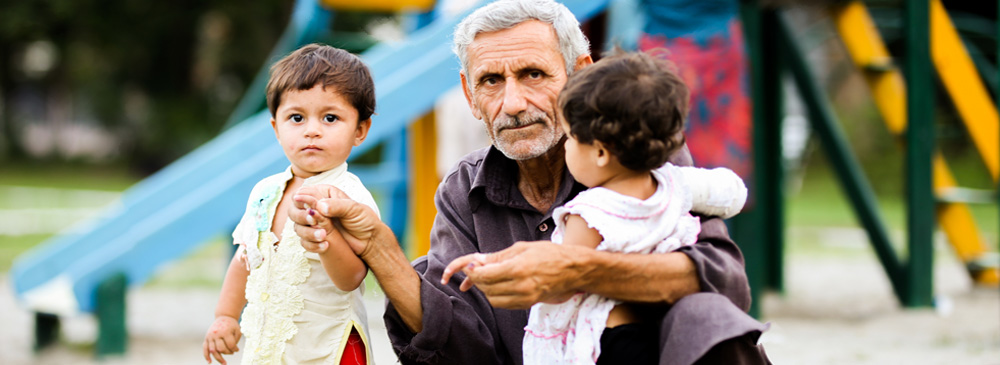
10 October 2023 ‒ The urgency of ending polio was impressed upon Member States at the ninth meeting of the Regional Subcommittee for Polio Eradication and Outbreaks in the Eastern Mediterranean, held during the 70th session of the WHO Regional Committee for the Eastern Mediterranean . Endemic wild poliovirus is present only in the Eastern Mediterranean Region, in just 2 countries: Afghanistan and Pakistan. Polio has no cure, and the strategy for its eradication is based on immunizing every child, through multiple high-quality vaccination campaigns.
At the meeting, Member States and Global Polio Eradication Initiative (GPEI) partners also acknowledged Dr Ahmed Al-Mandhari’s impressive leadership on polio eradication during his term as WHO Regional Director for the Eastern Mediterranean. He steps down from the post in January 2024.
Dr Al-Mandhari, who has had a pivotal role in establishing and leading the Regional Subcommittee, urged Member States to throw their full support behind all countries with continuing transmission. “Through a combination of programme improvements, political will and sheer hard work, wild poliovirus is now only circulating in the smallest geographic footprint,” he said. “We cannot let this history-making moment slip away. Now is the time to go all in.”
In her remarks, Regional Subcommittee Co-chair Her Excellency Dr Hanan Mohamed Al Kuwari, Minister of Public Health, Qatar, noted that eradication will only be achieved with collective action. “The epidemiology is clear: this is our moment,” she said. “The window is open now – and it will not stay open forever. Making the most of that window is not just a job for Afghanistan and Pakistan. It is the responsibility of our entire Region to help them through it, and in doing so, finally enable our Region to be certified as polio-free.”
His Excellency Abdul Rahman Mohammed Al Owais, Regional Subcommittee Co-chair and Minister of Health and Prevention, United Arab Emirates, urged Member States to put polio above politics to finish the job. “We cannot waver in our focus: to advocate with the relevant parties for access to all children . To detect transmission wherever it hides. To carry out consistently high-quality vaccination campaigns.”
Dr Chris Elias, Chair of the GPEI Polio Oversight Board and President of Global Development at the Bill & Melinda Gates Foundation, who attended the meeting, applauded the Regional Subcommittee’s strengths in advocating for children across the Region.
“Eradicating polio cannot be solved by any one country or partner,” said Dr Elias. “The Regional Subcommittee is an important forum for hearing about the progress and challenges in the last mile of polio eradication and for holding one another accountable to end polio for good. I’m pleased to be in Cairo this week to be part of these solutions-focused conversations, and know that, together, we will end polio.”
Technical update allows for cautious optimism
Following sustained efforts in Afghanistan and Pakistan, each country has only a single genetic cluster of wild polioviruses circulating, as at October 2023. Dr Hamid Jafari, Director of Polio Eradication in the WHO Eastern Mediterranean Region, noted in his technical update that, in 2020, 16 clusters of polioviruses had been circulating across the 2 countries.
Surveillance across the Region continues to be strengthened. The expansion of environmental surveillance is helping to further the polio programme’s ability to detect the virus – wherever it may be hiding – and mount a robust and timely response. “Continued scrutiny of the surveillance system, including through external reviews, has enabled the programme to maintain this sensitivity and correct course quickly, as needed,” Dr Jafari said.
In 2023, the polio programme has welcomed rigorous independent reviews from external monitoring bodies such as the Independent Monitoring Board (IMB) and the Technical Advisory Group for Afghanistan and Pakistan. Both have provided recommendations to help refine and improve polio eradication efforts.
While noting the serious challenges that remain in the way of delivering a polio-free world, Dr Jafari said that he is cautiously optimistic that the programme can stop transmission of the virus. He pointed to the promising epidemiological markers, the programme’s resilience and the political commitment to end polio in both the endemic countries.
Final push to end polio
Member States from across the Region were represented at the meeting, with many recognizing in their remarks Dr Al-Mandhari’s role in advocating for the polio agenda.
Echoing this sentiment were recorded video messages from GPEI partners and from the regional directors of the United Nations Children’s Fund (UNICEF) regional offices for the Middle East and North Africa and for South Asia. These messages also spoke of the entities’ renewed support for Member States in the Region as we edge closer to a future without polio.
In the session, Member States agreed to focus for the rest of 2023 and into 2024 on work to:
sustain and further focus regional and national commitments to stop endemic polio;
enhance national ownership of the polio transition process ; and
support an action plan to reach children in Yemen with vaccines to protect against the debilitating and ongoing outbreaks of variant poliovirus, measles and diphtheria.
The IMB noted in its September 2023 report scrutinizing GPEI that the Regional Subcommittee has played a vital role in ensuring collective ownership of the priorities for ending polio in the endemic and outbreak countries in the Region. As the outgoing Regional Director, Dr Al-Mandhari wished the Regional Subcommittee – under the co-chairs’ leadership, and supported by the incoming Regional Director ¬– success in closing the final chapter on polio eradication.
“Members of this Regional Subcommittee have actively championed the cause of polio eradication at every level. Our co-chairs have been instrumental in mobilizing funds and convening much-needed health dialogues for the endemic countries,” said Dr Al-Mandhari. “I truly hope this Regional Subcommittee continues to find meaningful ways to advocate for access to all children and leave no stone unturned as we inch closer to ending polio.”





